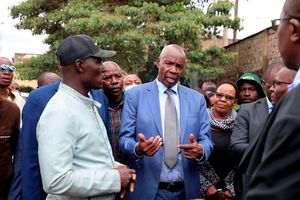Eliud who? Jubilee mustn’t relapse to the repressive ways of the Moi regime
What you need to know:
- "The government does not need any foreign-funded scheme to excite disaffection; it can do that pretty effectively by itself”
I don’t know very much about Eliud Owalo. I don’t hold brief for him, and I can’t vouch for his competence, integrity or credibility.
What I do know is that he occupied a senior post in former Prime Minister Raila Odinga’s presidential campaign machinery, and still retains a key place in whatever remains.
From there, I can judge that he might not have been very good at what he was employed to do, for he must have played a key role devising the spectacular implosion that turned victory into bitter defeat.
After that failure, one would have expected Mr Owalo to easily melt away into familiar obscurity. Instead, he is getting the recognition and fame that never came his way during his stint as head honcho at Mr Odinga’s campaign headquarters.
Mr Owalo, therefore, owes a debt of gratitude to the Kenya Police Service and the entire internal security edifice of President Uhuru Kenyatta’s government.
For reasons that are difficult discern, the police have decided to make Mr Owalo a person of interest. He has been called in numerous times for questioning on some alleged anti-government plot he is supposed to be masterminding.
I don’t know what police Inspector-General David Kimaiyo and CID boss Ndegwa Muhoro hope to achieve, but they are confirming the fears of those who say that this government wants to turn back the clock to the days of Nyayo-era repression.
Mr Owalo is supposedly being investigated for recruiting youth in a dark scheme to foment an uprising of the Arab Spring variety.
We are hearing talk of secret moments fuelled with “foreign money” to “excite disaffection”, and how the government will ensure peace is maintained a “whatever cost”.
First, the government does not need any foreign-funded scheme to excite disaffection. It can do that pretty effectively for itself.
Secondly, the language employed is eerily reminiscent of the darkest days of the one-party dictatorship and the infamous stage-managed Mwakenya trials and quickie convictions aided by the Nyayo House torture chambers.
“Exciting disaffection” reminds me of former Attorney-General Charles Njonjo and his ridiculous assertion during the regime of Jomo Kenyatta that it was punishable by death for anyone to imagine the death of the President.
At “whatever cost” must remind one of the extreme measure the Kenyatta and Moi dictatorships employed against all dissenting voices. Kenyans were tortured, detained without trial, jailed on trumped-up charges, killed, or simply made to disappear.
Those presently running the state security must be made to understand in no uncertain terms that this is the year 2013. Mr Kimaiyo, who is increasingly revealing himself as a political hatchet-man rather than a crime fighter, must be made to read the new Constitution.
So should his bosses, Interior Cabinet Secretary Joseph ole Lenku and Principal Secretary Mutea Iringo. If they do so, they will learn that the new Kenya guarantees certain inalienable liberties. They will learn that the laws of Kenya do not demand fealty and songs of praise to the political leadership.
I don’t know what Mr Owalo may be up to or whether he has any links to activist Okoiti Omtata’s March 4 Movement. What I do know is that any of them has the right to organise, to protest, to march, to sing and to express disaffection.
Indeed, that is the opposition’s raison d’être. It has the right to mobilise and canvass. Legitimate political activity cannot be criminalised. What is criminal is the undemocratic manoeuvre by those in power to stifle contrarian views.
* * *
The pavement outside my workplace has been dug up. Again. This time it is Safaricom laying fibre-optic cables for its digital city project. I suppose we must be prepared to bear some inconvenience as we move into the brave new world.
My fear is that Safaricom will finish its work, put back the paving stones, but before the mortar dries up, another operator will tear up the same stretch of pavement for its own cables.
That has been the story of the last two years. Can’t we simply have permanent underground passages for all future cables and pipes and wires and whatnot?




